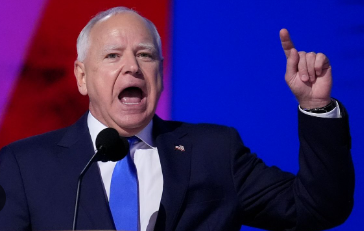VP Candidate Tim Walz Banished to the Timeless Void After Election

by Seph Fischer ’25
With the Democrats’ crushing defeat on November 5, questions of candidate fielding and campaign strategy have been raised among party insiders. Losing the House, the Senate, and the presidency via both electoral college and popular vote has proven to be a real moment of shock for the Democratic establishment, and many long-held assumptions about the nature of American politics are put into question in the hope of ensuring a future for the party. Among these reckonings has come the general consensus that the candidates fielded in the 2024 general election weren’t up to snuff, and as a result, Democrat leadership has decided that Vice Presidential candidate and Governor of Minnesota Tim Walz will be ejected from the realm of material Time and Space and into the Timeless Void, where he is to remain for all of eternity.
It’s not the first time that either major party has considered such a drastic change in strategy. After presidential hopeful Mitt Romney’s 2012 defeat, then-Senate Majority Leader Mitch McConnell confirmed that his “capos” had “whacked that wiseguy” in a bombastic speech at the 2016 RNC. Since then, Romney hasn’t been mentioned once by an elected Republican. After his 1984 landslide defeat, Democrat presidential candidate and former Vice President Walter Mondale had “his atoms disassociated,” according to party leadership at the time. It’s unclear what this necessarily meant, but Mondale was only heard from in radio interviews until his death in 2021. Democrat leadership made similar statements about presidential nominee George McGovern after Richard Nixon’s landslide victory in 1972.
It’s likely that Democrats are hopeful that Walz’s banishment to the Void, outside the realm of the Imperishable Flame of Creation, will signal to allies and voters that the party refuses to stagnate. Walz’s exile through the Door of Night to the ancient Void, which has existed before material Creation and will exist eternally after the end of Time, might show loyal supporters and possible future swing voters that the party remains vigorous, and is not just another torpid American institution. Whether this strategy will be appealing to prospective 2026 and 2028 voters, who decisively rejected the Democrats in 2024 remains to be seen.